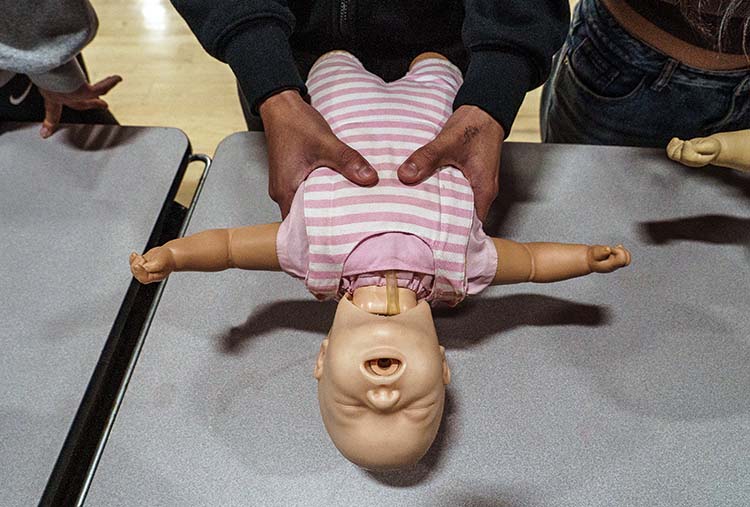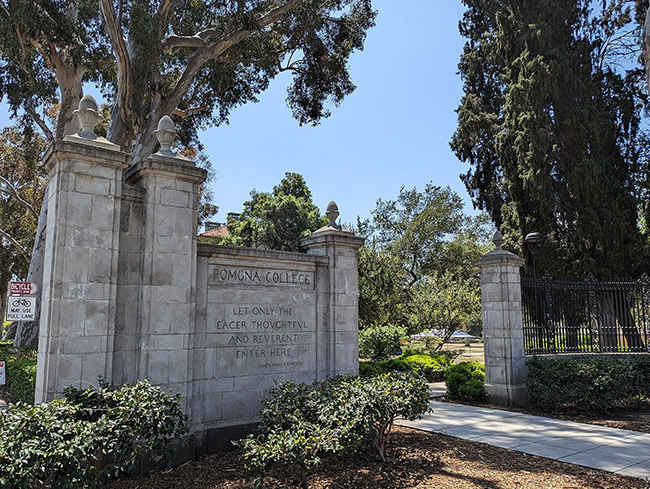Council passes rent ‘stabilization’ program, punts on protections

Housing advocate Lydia Hernandez listens at the Claremont City Council meeting on Tuesday at city hall. Courier photo/Steven Felschundneff
by Steven Felschundneff | steven@claremont-courier.com
It became increasingly clear late Tuesday that the Claremont City Council was not coming to a consensus on a highly anticipated package of renter protections.
Following lengthy public comment from both sides of the heated issue, the council struggled to agree on whether it supported a just cause eviction ordinance at all. It did eventually concur to protect Claremont’s renters from certain “no fault” evictions, but ran out of time to hammer out the details. So, very early Wednesday morning the council voted unanimously to table the ordinance until its May 9 meeting.
Also delayed until May 9 was an ordinance that would cap annual rent increases in the city.
In a separate unanimous vote, the council agreed to create a Temporary Housing Stabilization and Relocation Program, tapping portions of its American Rescue Plan Act monies to help struggling tenants pay rent and provide grants to some landlords who need to make necessary repairs to their properties.
The initial staff proposal was to create a rental assistance program and fund it with $300,000 over a three-year period. However, during its discussions the council concluded that $100,000 per year was too low to make any kind of meaningful impact on home affordability.
They also considered the possibility that small time “mom and pop” landlords who were negatively impacted by the pandemic and now face high inflation might have trouble making needed repairs to their rental units.
The final decision was to create a hybrid program to support both renters and landlords and boost the funding to $1 million to be drawn from the roughly $4 million the city has left in its ARPA coffers. That money must be expended by the end of 2026, so a separate source of money would need to be identified for the program to become permanent.
Council member Jed Leano said he could not think of a better use of American Recue Plan Act money than helping people stay in their housing.
Details on the program, which would be funded beginning July 1, will be coming in a couple of weeks, according to Public Information Officer Bevin Handel.
The deliberations over the renter protection ordinances were complicated by the absence of Mayor Ed Reece, who recused himself because he owns rental property in Claremont. This quickly brought up the real possibility that the council could be split 2-2 on several key issues.
In order to begin the conversation about the details in the just cause ordinance, the council first had to agree it was needed. This was complicated when council member Corey Calaycay asked to hear the details before voting. The body was stymied briefly until Mayor pro tem Sal Medina broke the stalemate by signaling his support for the ordinance.
For Claremont’s many renters, Tuesday’s council meeting was supposed to be when they would learn how much extra protection the city was willing to offer above current state law.
The California Tenant Protection Act, Assembly Bill 1482, which became law January 1, 2020, set an annual rent increase cap of 10% or the rate of inflation plus 5%, whichever is lower.
Many longtime renters complained during public comment that 10% is far too burdensome because landlords could make such adjustments annually, which in five years would amount to a 50% increase in their housing costs.
The act prohibits many evictions that lack just cause, covering a wide range of circumstances in which the tenant has abided by the terms of a rental agreement and paid rent in a timely manner, but the landlord still wants the tenant to vacate the unit.
Called a “no-fault” eviction, under AB 1482 a landlord can evict someone without cause if they themselves intend to occupy the property or have a close relative move in; withdraw the unit permanently from the rental market; must evict to comply with a government issued order; or to substantially remodel the unit.
This last provision, which has earned the nickname “renoviction,” was the basis the owner of Monarch Terrace cited for the blanket evictions of longtime tenants at that Claremont apartment building last fall. Those plans were temporarily placed on hold as long as the county’s Covid-era eviction moratorium was still in effect.
During its October 25 meeting last year, the council passed a temporary moratorium on certain “no-fault” evictions after hearing from Lydia Hernandez and her neighbors about their landlord’s plans to evict every long-term tenant from Monarch Terrace so that units could be renovated and re-rented at substantially higher rates. That moratorium is set to expire June 30, which has initiated some urgency for the council to act on a permanent set of rules.
“The City Council directed staff to use the moratorium period to conduct stakeholder and community outreach on tenant protections — specifically, permanent no-fault eviction and rent stabilization ordinances and a rental assistance program,” according to the staff report.
During her presentation, Assistant to the City Manager Katie Wand provided evidence that many of the city’s tenants are considered “rent burdened,” because a significant chunk of their income goes to housing.
Of the city’s 4,160 renter households, 53.8%, or 2,238 families, spend more than 30% of their gross income on housing, which is the threshold for being considered rent burdened. Furthermore, 27.1%, or 1,126, pay in excess of 50% of their income on housing, making them severely rent burdened.
Rent relief proponents say these stats support tenants’ complaints that they cannot afford the annual rent increases allowed under existing state laws, and they implore local officials to set a lower cap.
Landlords counter they have yet to recover from the financial hit brought on by Covid-era eviction moratoriums, which prohibited them from removing renters who failed to pay rent. As a result, many are owed back rent they fear will never be repaid. They say AB 1482 is yet untested and asked the council to give the state law time to show if it works or not.
Renter protections will be discussed during the Claremont City Council’s May 9 meeting, held at the council chambers 207 N. Harvard Ave. Or via Zoom at ci.claremont.ca.us, search “watch city council meetings.” The meeting starts at 6:30 p.m.










0 Comments